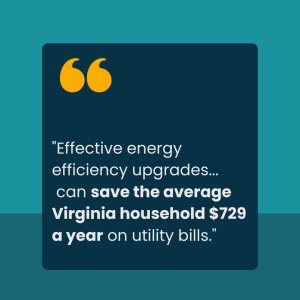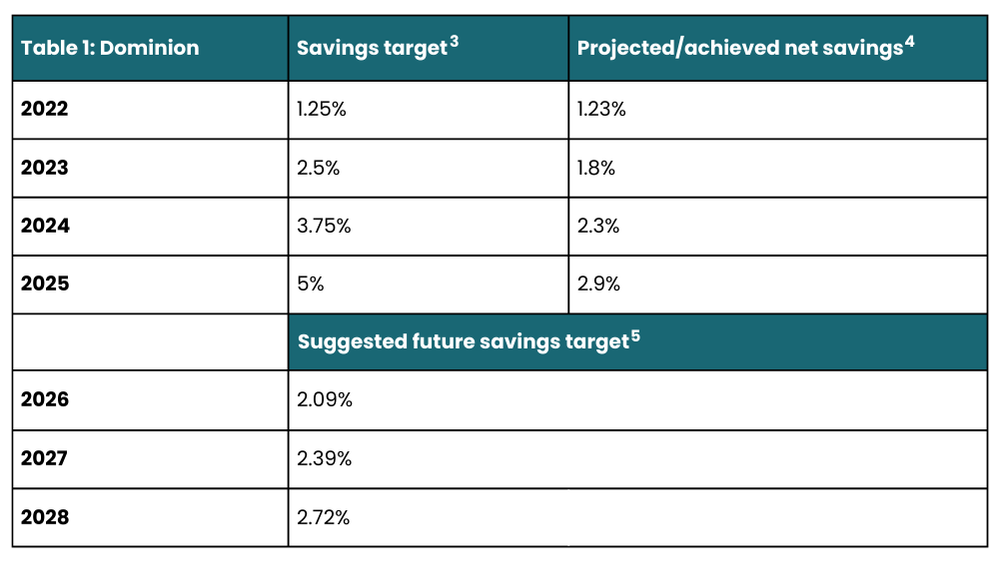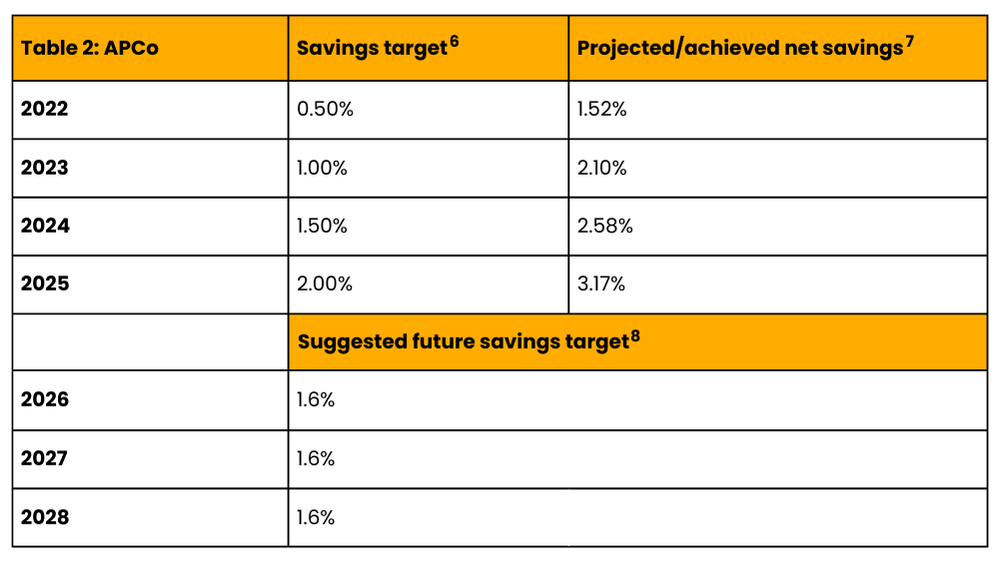unpacking virginia’s energy efficiency targets:
what’s happening and why it matters
By: Savannah Wilson and Kendl Kobbervig
Energy efficiency is about using less energy to achieve the same results, making it a critical tool for reducing costs, pollution, and strain on our energy grid. It is often the most cost-effective way to meet energy demand, offering significant financial savings and environmental benefits.
In 2020, the Virginia Clean Economy Act (VCEA) set ambitious energy efficiency savings targets for Dominion Energy and Appalachian Power Company (APCo) for 2022-2025. These targets are designed to be updated and increased on a regular basis to shift Virginia’s two largest electric utilities away from a model focused solely on selling more energy to one that also encourages efficiency and conservation.
In July, the Virginia State Corporation Commission (SCC) determined that Appalachian Power Company had met its 2022-2025 energy efficiency targets while Dominion had not.
what is an energy efficiency target?
An energy efficiency target is a goal set by regulators or a utility to reduce energy consumption through efficiency investments such as home energy audits, smart thermostats, incentives for upgraded electric vehicle chargers, rebates for energy efficient appliances or rewards for using less energy during periods of high demand.
For Dominion and APCo, these energy savings targets specify the percentage by which the utility needs to reduce customer energy consumption per year through 2025.
Dominion Energy
 Regulators at the SCC found that Dominion fell short of its 2022 energy efficiency targets, reaching savings of only 1.23%. By 2025, the shortfall between Dominion’s projected net savings and its targets would equate to enough energy to power the city of Richmond for a year¹, or the carbon dioxide emissions of 116,627 additional cars on the road.²
Regulators at the SCC found that Dominion fell short of its 2022 energy efficiency targets, reaching savings of only 1.23%. By 2025, the shortfall between Dominion’s projected net savings and its targets would equate to enough energy to power the city of Richmond for a year¹, or the carbon dioxide emissions of 116,627 additional cars on the road.²
Moving forward, Dominion has proposed a target of just 2.72% by 2028, far below its 2025 requirement of 5% (Table 1). By failing to meet its targets in the past and setting unambitious targets for the future, Dominion not only forgoes potential bonuses for itself but also denies substantial cost savings to its customers. Effective energy efficiency upgrades, such as efficient heat pumps, duct sealing, and insulation, can save the average Virginia household $729 a year on utility bills.

Appalachian Power Company
The SCC found last month that APCo exceeded its 2022 energy efficiency targets, reaching projected net savings of 1.52%. However, moving forward, APCo proposes total savings of just 1.6% per year (Table 2), a target they have already demonstrated they can meet and far exceed.
APCo customers facing the prospect of yet another rate hike this fall deserve a commitment from their utility to using the cleanest and cheapest resources available to meet demand.

our utilities can be doing more
Utilities in other states are achieving much higher energy efficiency targets than those proposed by APCo and Dominion. For example, Illinois utilities Ameren and Commonwealth Edison are required to increase their energy efficiency savings significantly, between 2.8 and 6 times more than the amounts APCo and Dominion have proposed.
- Ameren: Required to increase savings by 4.2% between 2022 and 2028
- Commonwealth Edison: Required to increase savings by 6.6% in the same period
Dominion has also demonstrated potential for greater savings. In 2021, a consultant developed a long-term plan for the utility with recommendations to improve energy efficiency. However, as highlighted in testimony from Appalachian Voices during Dominion’s future targets case, the utility has consistently ignored many of these recommendations, passing up clear opportunities to increase savings for its customers.9
why energy efficiency matters
Energy efficiency upgrades can save the average Virginia household $729 annually on utility bills. For businesses, improving energy efficiency can eliminate up to 30% of energy waste. Moreover, effective energy efficiency programs can halve U.S. greenhouse gas pollution by 2050, highlighting their critical role in combating climate change.
Energy efficiency is generally the lowest-cost resource available to satisfy electricity demand. These cost savings are especially striking when considering nuclear and fossil-fuel generation sources, which cost three to four times as much as utility energy efficiency programs. Effective energy efficiency programs can lead to lower bills for customers, who would otherwise have to pay for using more energy, along with the higher costs of building new electric infrastructure.
The reductions in energy demand achieved through energy efficiency also decrease pressure on the grid, minimizing the chance of electric service disruptions.
The levelized cost of energy efficiency compared with other resources. Source: ACEEE, “Energy Efficiency as a Resource,” https://www.aceee.org/topic/energy-efficiency-as-a-resource
The Path Forward
The State Corporation Commission’s upcoming decisions on energy savings targets for utilities will shape Virginia’s energy future. By setting ambitious goals, the Commission can ensure utilities are driven to prioritize energy efficiency, delivering benefits to both consumers and the environment.
The SCC will hold a public hearing on Dominion’s proposed 2026-2028 energy efficiency targets on October 15th and a public hearing on APCo’s targets on November 4th.
- Sign up to speak virtually by October 8th at Dominion’s hearing using this form: Virginia SCC – Public Witness Form. The case number is PUR-2023-00227.
- Sign up to speak virtually by October 28th at APCo’s hearing using this form: Virginia SCC – Public Witness Form. The case number is PUR-2024-00134.
Engage with Us
Stay informed about Virginia’s energy efficiency journey and join the conversation on how we can push for affordable and clean energy. Subscribe to our email list for regular updates and opportunities for action.
What do you think about the current targets and proposals? Share your thoughts and questions at [email protected]!
